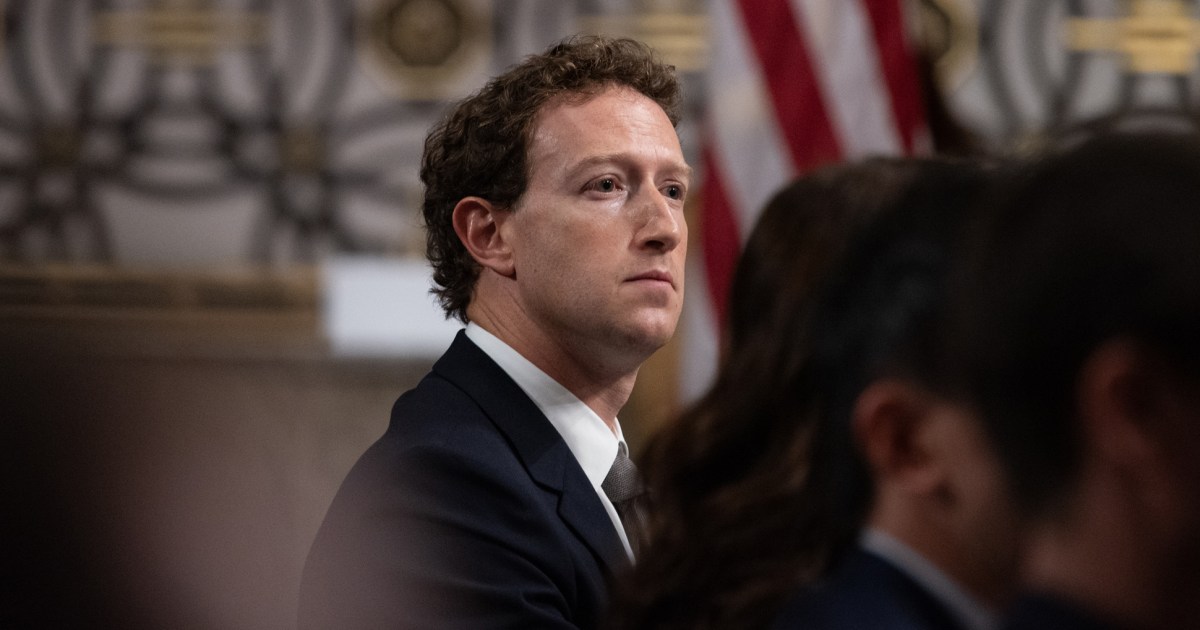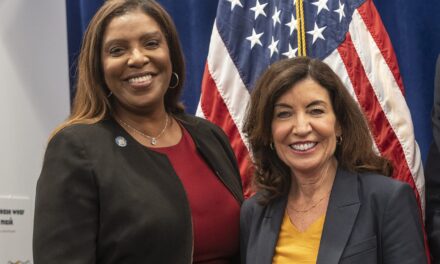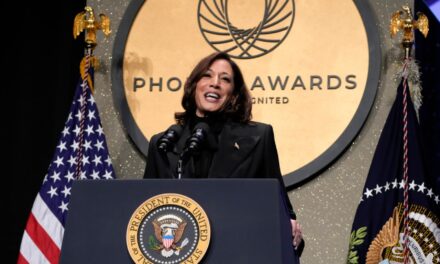
Meta CEO Mark Zuckerberg’s announcement Tuesday that he was ending professional fact-checking on Facebook and Instagram was the culmination of months of effort to position the social media giant for the conservative pressures of a second Trump administration.
Zuckerberg, once a supporter of a handful of progressive causes, including fighting mass deportations, who repeatedly met with — and sometimes criticized — Barack Obama during his presidency, began dropping hints last summer that he was preparing to politically lean in on supporting Donald Trump, a maneuver he is now in the process of pulling off.
The first hints came in July, when Zuckerberg praised Trump’s response to having nearly been assassinated, saying Trump’s raising his fist after the shooting was “one of the most badass things I’ve ever seen in my life.” Zuckerberg at the time tempered the praise, though, saying he would not endorse a presidential candidate.
Also that month, Meta removed special restrictions it imposed on Trump’s Facebook and Instagram accounts after the Jan. 6, 2021, attack on the U.S. Capitol — essentially giving Trump a fresh start on the platforms after it had suspended and then reinstated him.
Other rightward steps soon followed.
In August, Zuckerberg attacked the Biden administration’s response to Covid-19 misinformation, alleging that the government had pressured the company to “censor” content. His criticism was far harsher than his previous characterization of interactions with the government in an interview with podcaster Joe Rogan, and it was a change from Meta’s previous rhetoric, which early in the pandemic embraced a hard line against hoaxes and other unscientific health advice.
In late August, Zuckerberg allowed a personal threat from Trump to pass by with no response. After Trump released a book of photographs in which he said Zuckerberg “will spend the rest of his life in prison” if he does “anything illegal” to influence the presidential election, Meta declined to comment.
During the presidential campaign, Meta’s corporate political action committee did not give to either major candidate, even as Meta’s individual employees gave generously to Vice President Kamala Harris — nearly $2 million, according to the transparency website OpenSecrets. The corporate PAC gave $30,000 each to the Republican and Democratic senatorial campaign committees, spread cash around to Democratic and Republican leaders in the House and the Senate and emphasized backing incumbents in Senate races.
After the Nov. 5 election, Zuckerberg posted well-wishes to Trump. Last month, Meta said it had donated $1 million to Trump’s inaugural fund. And last week, Zuckerberg elevated a longtime Republican insider, Joel Kaplan, to be Meta’s head of global policy, replacing Nick Clegg, a former British deputy prime minister whose record was less conservative than Kaplan’s.
On Monday, Meta announced new members of its board of directors, including Dana White, the CEO of Ultimate Fighting Championship and a longtime friend of Trump’s.
The speed with which Zuckerberg changed his political tune was breathtaking for longtime observers of the company.
“Zuck’s announcement is a full bending of the knee to Trump and an attempt to catch up to Musk in his race to the bottom,” Nina Jankowicz, a disinformation expert, said on Bluesky, referring to tech billionaire Elon Musk. She is the CEO of the American Sunlight Project, which fights disinformation.
A Meta insider said: “Mark is a very centrist executive. He’s not a partisan either way.” The person added, “But he has a cadre of professional political advisers and executives that have Republican profiles that are ascendant in the company.”
David Sacks, a venture capitalist who is Trump’s incoming adviser on cryptocurrency and artificial intelligence, said Zuckerberg’s announcement was a “turning point,” and he credited Trump.
“Thank you President Trump for creating this political and cultural realignment,” Sacks said on X.
Zuckerberg, who co-founded his company nearly 21 years ago, is hardly alone in corporate America in shifting policy to match political winds, but his pivot is unique because of the dominant position of Meta in how Americans communicate online. Four Meta apps — Facebook, Instagram, WhatsApp and Messenger — are among the most widely used internet platforms.
Zuckerberg, 40, has also cozied up to some prominent Democrats over the years, including Obama, who visited the headquarters of Meta, then known as Facebook, in 2011.
Zuckerberg and Facebook were in the middle of a crisis when Trump was elected in 2016, combating allegations that fake news on Facebook influenced the results of the election. In 2020, when Joe Biden won, Zuckerberg told employees that he had won fair and square, making a point to vocally affirm the election results and reject Trump’s contention that the results were rigged while noting that Trump had earned many legitimate votes.
In a five-minute video announcing the latest changes, Zuckerberg mentioned several reasons for the policy shift. He cited a speech he gave at Georgetown University in 2019, when he criticized “traditional gatekeepers in politics or media.” He also cited the November election, calling it a “cultural tipping point” for less content moderation.
Asked about Meta’s rightward steps over the past six months, a company spokesperson declined to comment but pointed to the 2019 Georgetown speech as evidence of consistency.
Meta also has tangible stakes in which policies the incoming Trump administration adopts, including whether the Federal Trade Commission proceeds to trial in April in an antitrust case seeking to unwind the company’s 2012 purchase of Instagram.
Zuckerberg is the third-richest person in the world, with a net worth of $223 billion behind Musk and Amazon founder Jeff Bezos, according to the Bloomberg Billionaires Index.
He has often demonstrated an eye for where political and regulatory pressures were headed. In 2017, after Facebook disclosed that Russian operatives had used the site to try to sway the 2016 presidential election, the company and its competitors undertook a massive effort to head off new federal laws, including announcing voluntary transparency measures such as a public database of advertisements.
But other times, Zuckerberg has appeared to be taken off-guard by criticism from the right. In 2020, he and his wife, Priscilla Chan, poured $350 million into technology funds and other nonpartisan grants to election offices nationwide to try to improve election administration — only to be excoriated later by Republican state lawmakers despite the nonpartisan nature of the effort. Zuckerberg abandoned the effort for the 2022 election cycle.
Zuckerberg has donated money to Democratic and Republican campaigns over the years, including to support former House Speakers Nancy Pelosi, a Democrat, and Paul Ryan, a Republican, according to OpenSecrets.
Four years ago, as Biden was preparing to take office, Meta announced it was hiring a lawyer who worked in the Obama Justice Department, Roy Austin, as a vice president of civil rights.
Now, Zuckerberg has a growing staff of Republican operatives helping guide policy at Meta. Kaplan is a former deputy chief of staff in George W. Bush’s White House, and before his promotion last week, he joined Trump and Vice President-elect JD Vance at a photo-op last month at the New York Stock Exchange.
Meta’s chief legal officer is Jennifer Newstead, another veteran of the George W. Bush administration who helped get the Patriot Act, which authorized increased government surveillance after the Sept. 11, 2001, attacks, through Congress. She joined Meta in 2019, during Trump’s first term.
Kevin Martin, Meta’s newly promoted vice president of public policy, was chairman of the Federal Communications Commission during Bush’s second term.
And last year, Meta added to its policy team Dustin Carmack, a former adviser to Florida Gov. Ron DeSantis and a co-author of Project 2025, a plan that is helping guide Trump’s transition team.
Sheryl Sandberg, who for years was the most prominent Democrat at Meta as its chief operating officer, left her day-to-day role in 2022. She left its board of directors last year.
There are no longer any prominent Democrats in Meta’s C-suite, although there are some further down the organizational chart, including David Ginsberg, a vice president for communications. He previously worked for Obama’s and John Kerry’s presidential campaigns.




